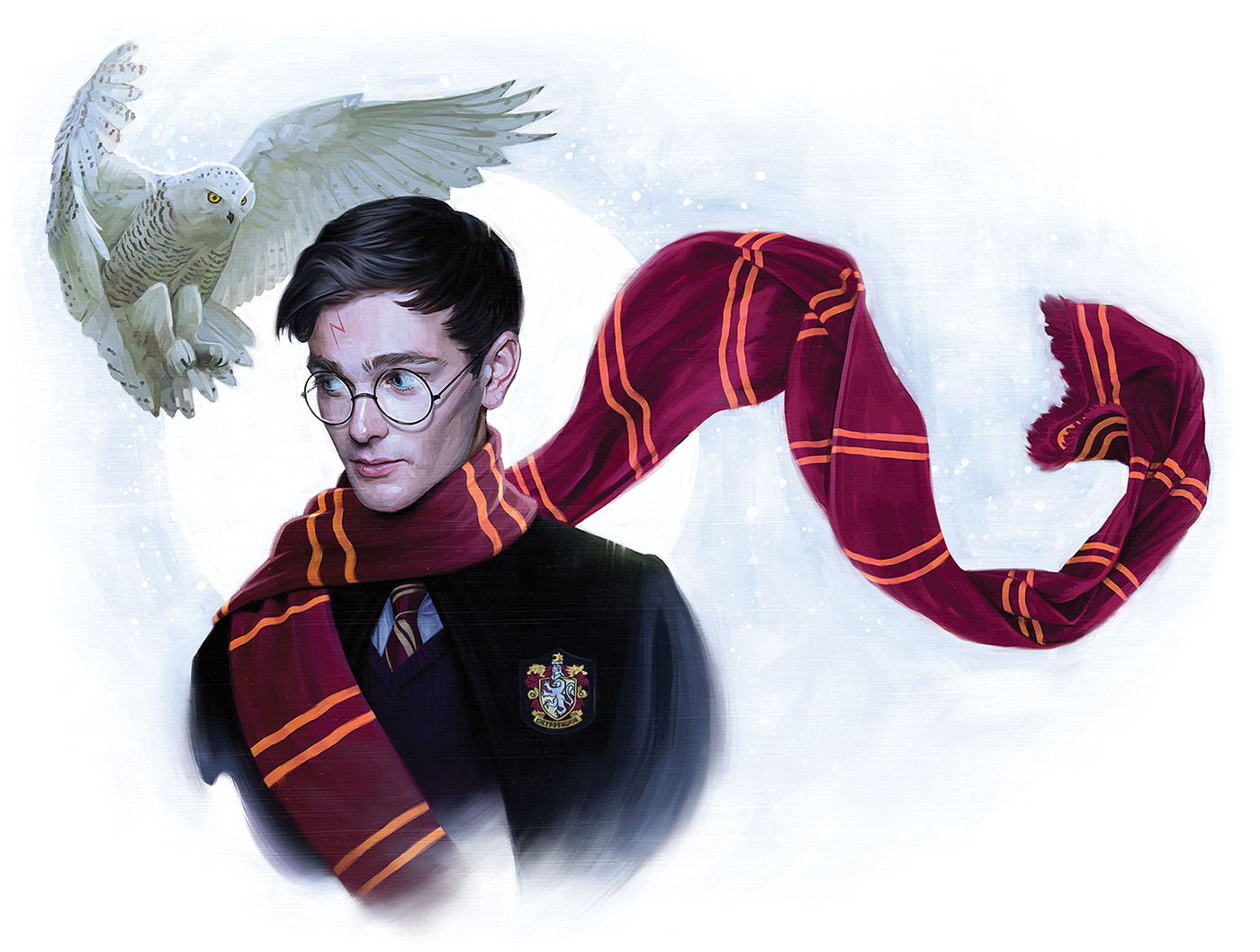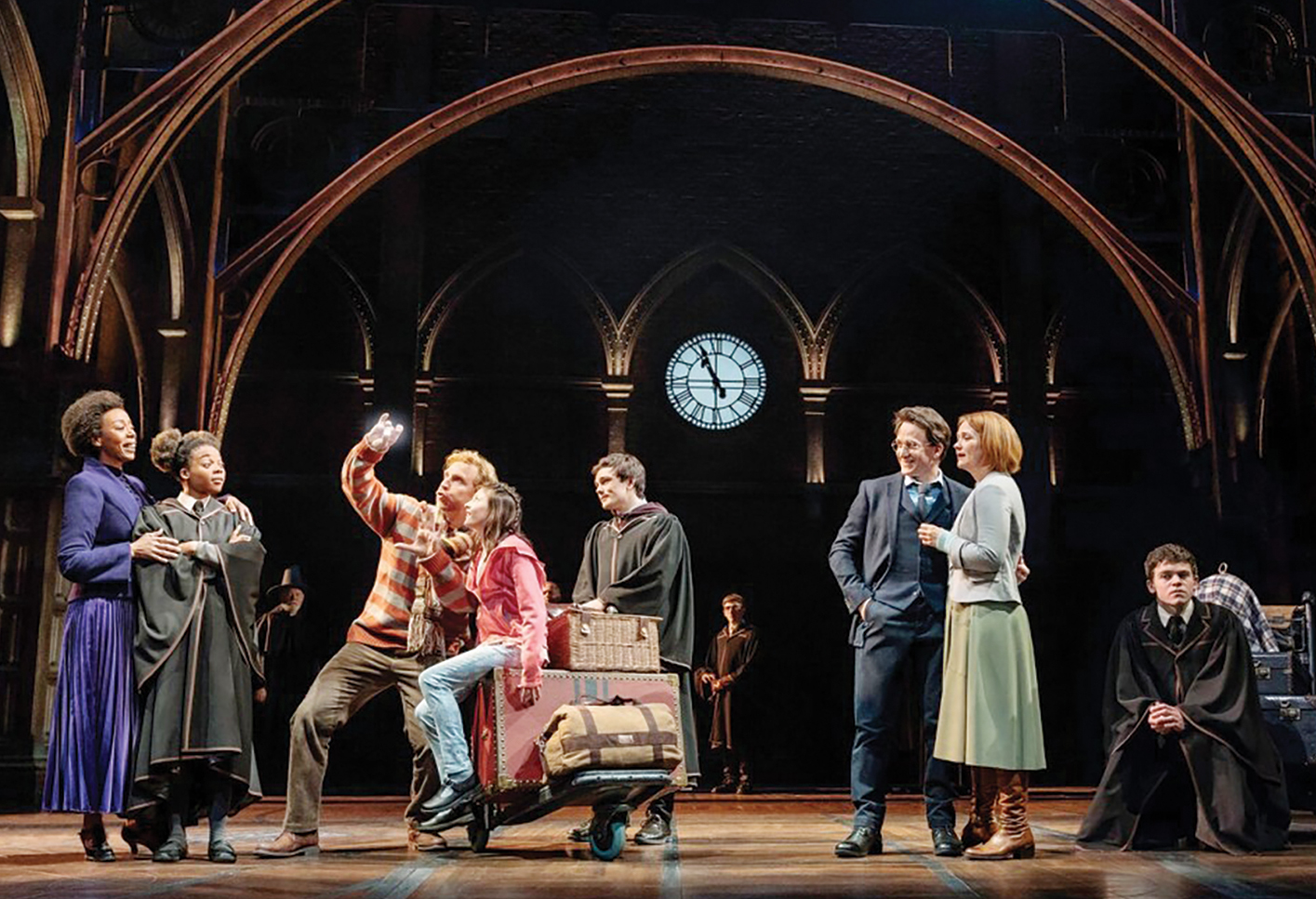
The Lyric Theatre, on West 43rd in New York City, is a Broadway institution that has been razed and rebuilt many times throughout its storied history, though it likely has never undergone the kind of transition required for the current show, an intimate production of a little-known play that goes by the name of Harry Potter and the Cursed Child.
Standing across the street, one can see the vast swooping arc of the title splayed across the entire facade, reaching its apex on the roof of the building to the west, where what looks like a bird’s nest is perched some 10 storeys above ground. It’s a spectacular sight that comes before you even step in the theatre.
Once inside, you can see how much time and money has been dedicated to making this production one to remember, which is a rather high bar on Broadway. Hundreds of seats were removed to create better sight lines. The ceiling was re-done to incorporate Hogwartian details. Even the carpet was re-laid and embroidered with HP symbols. Based on ticket sales, the renos are worth it. The show has been sold out nightly since it opened, and it’s predicted to run for years, accumulating what are almost surely going to be record gate numbers. Oh, and it won six Tonys this past spring, just to give a massive commercial hit an overlay of critical cachet.
So, the scene is set. Harry Potter and the Cursed Child is one of the biggest things to hit Broadway in years. Millions have been invested. J.K. Rowling has put her reputation on the line. The public is hyperventilating.
All of which makes it somewhat surprising but mostly delightful that one of the key roles in the production – that of James Potter, Harry’s oldest son – is being played by Edmonton’s own Benjamin Wheelwright.
Wheelwright can laughingly look back on the pressure he faced during high school in Edmonton, when he was performing a one-act play and dropped a line. The audience burst out laughing. “Not with me,” says Wheelwright, “at me! After that experience, nothing can be that terrifying, because there is no pressure like performing in your school play in front of your peers. You screw up and you’re going to hear about it in the halls for months.”

The halls he’s referring to are those of Victoria School of the Arts, an Edmonton K-12 school that caters to the artistically inclined, many of whom gravitate there once they hit their teens. Not Ben Wheelwright. He was in line on the first day of kindergarten.”I remember my first part was in Romeo and Juliet and that the show ended past my bedtime! That was Grade 1. But I think I was first aware that I really loved the theatre when I was maybe 10 or 11 years old.”
Wheelwright did the school play every year and worked at the Citadel and various University of Alberta productions, but he had encouragement at home, too. His mother, Catrin Owen (the former CEO of Calder Bateman and current deputy city manager, communications and engagement with the City of Edmonton), has deep ties to the Edmonton arts and culture communities. She introduced her son, an only child, to the arts in all its forms – theatre, galleries, music, books. It was an artistically omnivorous upbringing, so much so that she once told her son that they didn’t go to church but had the theatre instead.
Owen recalls those early days well. “I remember, I think he was about 10 years old, when he first said to me that one day he wanted to win a Tony. I had to Google it. I had no idea what a Tony was. But that was one of the clues. There was a level of ambition that surprised me and made me take him seriously.”
Long before his current moment arrived, however, Wheelwright passed through years of apprenticeship – show after show in high school, at Vic, the Citadel and the U of A’s Timms Centre. “The way I looked at it,” says Owen, “was that it was just like any other kid who loves a sport, except for him, theatre was his thing.”
After high school, Wheelwright attended the National Theatre School in Montreal. Once he graduated, he moved to Toronto, but the only steady work he found was slinging beer and wings and espresso at downtown sports bars and coffee shops. After a year, he knew Toronto wasn’t working for him, and took money he’d saved up and went off to visit his relatives in Wales. He’d been there one day when his agent called him and told him to get down to New York City for an audition as Christopher in Curious Incident of the Dog in the Night-Time. They arranged an audition in London, and he got a call back for another. This time he flew back to New York.
“I took the money I’d set aside to go to Europe,” he says, laughing, “and used it to get back to New York. But I guess it paid off.”
That’s an understatement. It was Wheelwright’s big moment. He played alternate Christopher (meaning, he played the role on days when the lead was off, which was usually two performances a week) during the yearlong Broadway run of the show, as well as the yearlong American tour of the show through 31 cities. Then, three-quarters of the way through the Curious Incident tour, he heard about auditions coming up for a new hush-hush Harry Potter show. He was in Boston and zipped down to New York on an off day. Two auditions and a movement call later, he was James Potter.
Ben Wheelwright stands five-foot-seven, with a slight but athletic build. He has dark hair, a winning smile, and yet also carries something of a tinge of sadness behind his blue eyes. These details are relevant because Wheelwright has come to learn – because you have no choice but to learn – that acting is a physical business.
“Oh yeah,” he laughs. “You get into an audition thinking you might be great for a part, you’ve done all the work getting ready, you’ve done the work at school, you’ve studied scenes, you’ve mined the text… but if you’re not the right height, you don’t get the part. That can be a tough part of the business.”
But Wheelwright has learned to make the surface element of the industry work in his favour, in part because he’s not hard to look at, but more because he uses the knowledge of the arbitrariness of it all to help bleed off the pressure.
“Once you get over that fence,” he says, “and realize that if you don’t get a job it’s not because you don’t have talent and that it was about the look, then it becomes easier. You take some of the pressure off yourself.”
Which is vital. Imagine taking the fear of public speaking and add the challenge of inhabiting other characters, memorizing a couple thousand words of dialogue, and doing it in New York City in front of patrons paying thousands a pop to watch you pull it off. Stir a few critics in. Then do it twice a day, five days a week, for a year or two, making sure that each and every performance is magical. No pressure there.
Wheelwright laughs when I put it to him this way. You have to learn how to harness the energy and nervousness, he says, because it gets distilled into pure excitement. And if you can’t, it’ll eat you alive.
“There are always nerves,” he told me. “You’re sitting backstage and you get the 15-minute call, and you hear the audience coming in and you just know how excited they are.”
While he’s currently on a magical run as a famous wizard’s son, Wheelwright is all too aware of the fickle nature of the business he’s in. Life couldn’t possibly be any better right now: On stage in the world’s most important theatre town working with the vision of the world’s most famous author. But this show will end. There will be other shows. Or not. It’s an unpredictable way to make a living and he knows it. His long-term plan is basically to not have a long-term plan and just focus on the process.
“This is a day-to-day thing. It’s all about surrounding yourself with really great people, and to have a career where you have a good body of work and to be happy while doing it. It’s just so important to stay challenged, to keep moving forward and progressing.”
Listening to Wheelwright talk with such maturity and insight, it’s sometimes easy to forget that he’s still a very young man. No doubt, the pressure he has already faced and is facing is part of what gives him his preternatural calm. Part of it could also be due to being from Edmonton, a blue collar and unpretentious town. Part of it no doubt stems from being raised by a mother who sees the value of craft in the context of diligence (“It’s great to see someone you love working at the level they want to work at,” says Owen, “but it’s also just a job.”). Whatever the reasons, Wheelwright seems abnormally grounded for someone working at such a high level at so young an age. I asked him what all this has taught him about himself, these experiences of being part of two high exposure productions so early in his career. His answer sounded like words from an old soul, not someone who looks as if he might not have to shave every day.
“If I could talk to myself back when I was working at a beer and wings joint in Toronto after finishing theatre school in Montreal,” he says, “back when I was taking everything so seriously and being so hard on myself when I’d drop a line in an audition and think to myself, ‘Oh, I am just not cut out for this.’ If I could do that, I think I’d remind myself not to take it so seriously. Have some fun. Have a light heart around it all.” He offered what sounded like advice we could all use. “I’m definitely serious about my work, but I’ve learned to lighten up a bit. It’s important to know that other people aren’t thinking about you as much as you’re thinking about yourself!”
Wise words. Only in this instance, it would appear he is incorrect. He might think people aren’t thinking about him that much, but these days he seems to be on everyone’s mind. Don’t look for that to change anytime soon.








